Property rights violations in HOA communities are more common than many homeowners realize. If you’ve wondered, “Can my HOA trespass on my property?” or found HOA representatives on your land without permission, you’re not alone.
Knowing when an HOA can legally enter your property – and when they’re trespassing – protects your rights as a homeowner.
Need a Miami HOA or COA dispute lawyer? At Gomez Law, we exclusively represent homeowners against their associations. Eduardo Gomez brings over 20 years of litigation experience to help homeowners protect their property rights when associations violate those rights.
Understanding Trespass Law and HOA Communities
Trespassing in HOA communities creates conflict between homeowners and associations. Trespass occurs when someone enters another person’s property without permission. However, HOA communities operate under unique legal frameworks that can complicate traditional trespass concepts.
Under Florida law, your property rights as a homeowner include the right to exclude others from your land. This means generally, no one, including your HOA, can step onto someone else’s property without consent or legal authority.
Any unauthorized entry could constitute trespass, regardless of the person’s intentions.
When you purchase a home in an HOA community, you agree to certain restrictions through the governing documents. These documents may contain provisions outlining the HOA’s limited authority to enter private property under specific circumstances. However, these rights aren’t unlimited, and HOAs must follow proper procedures.
The declaration allows the Homeowners Association certain rights, but the CC&Rs and HOA bylaws spell out when and how the association can enter homeowner property.
Knowing what your specific governing documents say about entry rights helps determine whether an HOA’s actions are considered hoa trespassing.
When Can an HOA Legally Enter Your Property?
While homeowners have strong property rights, there are times when the hoa may have the right of entry onto private property under a few circumstances. The association can enter property for specific reasons outlined in governing documents.
Emergency Situations
HOA communities typically allow associations to enter a homeowner’s property during genuine emergencies. For example, if a water leak could pose immediate danger to neighboring units, the HOA may have emergency authority for the hoa to enter.
However, even emergency entry rights have limits. The HOA must demonstrate the situation truly requires immediate action and that normal notice procedures would cause unreasonable delay.
Maintenance of Common Elements
In some communities, certain utilities or systems may extend onto private property while remaining the association’s maintenance responsibility. The governing documents may give board the power to enter property to maintain common elements, but this right typically requires advance notice.
Court-Ordered Entry
When other legal remedies have been exhausted, an absolute last resort an hoa must consider is obtaining a court order. This resort an hoa must consider requires proving to a judge that entry is necessary and the homeowner has refused reasonable requests.
Common Reasons an HOA Might Want to Enter Your Property
HOAs claim entry rights for various reasons. As a member of the hoa community, you should know when associations might overstep their authority.
Violation Inspections
Some HOAs attempt to enter a homeowner’s property to investigate alleged violation of the rules. However, most governing documents don’t give HOAs broad inspection rights on private property. The association typically cannot trespass simply to look for violations.
If your HOA claims inspection rights, carefully review your governing documents to determine whether this authority exists as part of the documents.
Architectural Modifications
When homeowners make unapproved changes, HOAs sometimes claim the right to enter someone’s property to remedy the situation. However, the authority to enter and alter property is extremely limited and usually requires either homeowner consent or court authorization.
Safety Inspections
Occasionally, HOAs claim rights to conduct safety evaluations on private property. While associations have legitimate interests in community safety, these interests don’t automatically override homeowners’ property rights.
What Constitutes HOA Trespassing?
Determining whether HOA actions constitute trespass requires analyzing both the association’s claimed authority and how they exercised that authority.
Entry Without Proper Authority
The most straightforward case of hoa trespassing occurs when association representatives enter someone’s property without legal right. This includes situations where governing documents don’t grant entry rights for the association’s stated purpose.
Failure to Follow Required Procedures
Even when HOAs have limited entry rights, they must follow specific procedures. Common procedural violations that can make otherwise authorized entry into trespass include:
- Failing to provide sufficient prior notice
- Entering at unreasonable times
- Exceeding the scope of authorized entry
- Using entry rights for purposes not specified in governing documents
Refusing to Leave When Asked
If an HOA representative enters your property and you ask them to leave, continued presence may constitute trespass even if initial entry was authorized.
How to Deal with Trespassing by Your HOA
When you suspect your HOA has committed trespass, taking prompt action protects your rights.
Document the Incident
Immediately document any suspected trespass. Take photos of any damage, write detailed descriptions, and gather witness contact information. This documentation will be needed if you take legal action.
Your content goes here. Edit or remove this text inline or in the module Content settings. You can also style every aspect of this content in the module Design settings and even apply custom CSS to this text in the module Advanced settings.
Review Your Governing Documents
Examine your CC&Rs and bylaws to know what entry rights, if any, your HOA possesses. Pay attention to notice requirements and any limitations on the association’s authority.
Communicate in Writing
Send written notice to your HOA board and hoa management stating you believe they trespassed. Ask them to provide specific authority under which they claim the right to enter and to cease unauthorized entry.
Consult with Experienced Attorneys
Property rights violations can have serious consequences. An experienced attorney can review your situation and help you know your legal options.
Your Property Rights in Florida
Florida law provides strong protections for homeowner property rights, even within HOA communities.
Exclusive Use and Quiet Enjoyment
As a homeowner, you have the right to exclusive use of your property. You can generally exclude others from your land, including hoa entering without permission.
Right to Reasonable Notice
When HOAs do have limited entry rights, Florida law requires reasonable advance notice. Homeowners shouldn’t tolerate surprise entries except in genuine emergencies.
Right to Protect Property
Homeowners can take reasonable steps to protect their property from unauthorized entry, including security systems and no trespass signs.
Legal Remedies for HOA Trespass
When an HOA commits trespass, several legal remedies may be available.
Injunctive Relief
Courts can issue orders stopping HOAs from trespassing. These orders are valuable when associations engage in patterns of unauthorized entry.
Monetary Damages
You may be entitled to compensation for damages caused by HOA trespass, including property damage and loss of use.
Attorney Fees
Florida law and many governing documents provide for attorney fee recovery in successful property rights cases.
Red Flags: When HOAs Overreach
Some HOAs claim broader entry rights than their governing documents provide.
Unlimited Inspection Claims
Be wary of HOAs claiming unlimited rights to inspect private property. Most legitimate governing documents limit inspection rights to specific circumstances.
False Emergency Claims
HOAs sometimes claim “emergency” authority when no genuine emergency exists. True emergencies involve immediate threats – not routine maintenance.
Verbal Permission Claims
Some representatives claim verbal permission to enter when homeowners never gave consent. Always insist entry permissions be documented in writing.
Eduardo Gomez: Protecting Property Rights
At Gomez Law, we know your home is your sanctuary. Eduardo Gomez has built his practice exclusively around representing homeowners – never associations.
Proven Experience
With over 20 years of litigation experience, Eduardo Gomez knows the complex interplay between HOA authority and homeowner property rights. We’ve successfully represented homeowners in trespass and privacy violation cases.
Bilingual Legal Services
Property rights issues affect homeowners from all backgrounds. Eduardo Gomez is fluent in Spanish and proudly serves Miami’s Hispanic community with clear communication throughout the legal process.
No Upfront Costs
We work on a contingency basis for many property rights cases – you only pay if we successfully resolve your case.
Florida Law and Entry Rights
Florida has specific laws governing when HOAs can enter private property.
Chapter 720 Requirements
Chapter 720 of Florida Statutes establishes HOA operation frameworks and includes provisions about property access. These laws limit HOA authority and establish procedural requirements.
Notice and Consent
Florida law generally requires property owners consent to entry or receive appropriate notice. HOAs cannot ignore these requirements simply because they believe they have legitimate reasons.
Prevention: Protecting Your Property
The best defense against HOA trespass is preventing unauthorized entry before it occurs.
Know Your Documents
Review your CC&Rs and bylaws to know exactly what rights your HOA has to enter your property. Knowledge of these provisions helps you recognize when the association exceeds authority.
Communicate Boundaries
Make your expectations about property access clear to your HOA board and management company. Written communication creates a clear record.
Consider Security Measures
Installing cameras, posting signage, and taking other security measures can deter unauthorized entry and provide proof that the hoa violated your rights.
Taking Action
If you believe your HOA has trespassed on your property, taking prompt action protects your interests.
Free Consultation
Contact Gomez Law today for a confidential consultation. We’ll review your case and explain your legal options for protecting property rights.
Protecting Your Investment
Your property rights are fundamental to enjoying your home. Eduardo Gomez and our legal team are ready to fight for your rights and make sure your HOA respects legal boundaries.
Standing Up for All Homeowners
When you take action against HOA property rights violations, you’re helping establish precedents that protect all homeowners from similar violations. Whether an HOA tries to enter someone’s property without permission or refuses to follow proper procedures, you don’t have to accept violations.
People will go to great lengths to protect their homes, and you shouldn’t have to face these challenges alone. If you’re dealing with trespassing in an hoa situation or classifying this as trespassing concerns, contact experienced legal help.
Contact Gomez Law today at (305) 790-2601 or visit our Coral Gables office at 145 Almeria Avenue to schedule your free consultation. We serve homeowners throughout Florida and are ready to help you protect your property rights against HOA overreach

